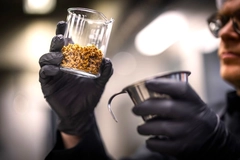
- Industry news
Industry news
- Category news
Category news
- Reports
- Key trends
- Multimedia
- Journal
- Events
- Suppliers
- Home
- Industry news
Industry news
- Category news
Category news
- Reports
- Key trends
- Multimedia
- Events
- Suppliers

The entry of a major European sugar producer to the German sugar market in particular would be able to dispel the competition concerns. In this respect a solution could possibly be expected to emerge soon with the Dutch company Koninklijke Coöperatie Cosun U.A., Breda.

18/02/09 The German competition authorities, the Bundeskartellamt, have conditionally approved Nordzucker’s acquisition of Danisco Sugar.
The approval is conditional on the sale of Danisco’s German sugar and bioethanol plant in Anklam to a “suitable purchaser”. According to the German competition authorities, Dutch-based Cosun may be a potential buyer of the plant in Anklam.
In July 2008, Nordzucker, Germany's second-largest sugar refiner, agreed to buy Danisco's sugar business for about 750 million euros ($948 million) pending regulatory approval.
All the other antitrust authorities in whose countries the transaction had to be registered – Estonia, Lithuania, Slovakia and Serbia – have already given Nordzucker the "go-ahead" for the planned purchase of Danisco Sugar.
The Bundeskartellamt said that the acquisition affects the German domestic market for industrial sugar (sugar for the food industry). Investigations by the Bundeskartellamt have shown that this market is characterized by an uncompetitive duopoly between Nordzucker and the largest German sugar producer, Südzucker AG.
The structural conditions in this market are influenced primarily by the European Sugar Market Regulation and its implementation in the Member States. These structural conditions range from substantial transparency on production costs and consumer prices through to a regulation of quotas via the award of sugar production quotas and extensive import control. The European Sugar Market Regulation already favours a market structure which is characterized by national monopolies or oligopolies. Added to these framework conditions is the general homogeneity of mass-produced industrial sugar and the general indispensability of sugar for the food industry. The Bundeskartellamt has found evidence of a mutual demarcation of distribution areas in large parts of Germany. It is not transport costs and the lack of production capacity which are the main factors preventing advancing competition in competitors’ key sales areas. Rather, the oligopolists themselves are refraining from making any competition advances in order to keep price levels high within Germany.
According to the Bundeskartellamt’s investigations Pfeifer & Langen, the third major German sugar producer, currently does not bring any substantial competition into the oligopoly either. The same applies to the European competitors. Moreover, the opening up of the European markets for sugar from third countries, which has been propagated by the European Commission, has had no effect so far, at least not in Germany.
The unrestricted acquisition of Danisco Sugar A/S by Nordzucker would have further expanded the joint dominant position held by Nordzucker and Südzucker. Not only the fact that the production capacities at the Anklam plant would have been added, but also the elimination of a powerful competitor would have strengthened the existing oligopoly in Germany. These effects are prevented by the obligation to sell the Anklam plant to a suitable third party before the acquisition project is put into effect.
The domestic competition potential of the Anklam sugar production plant can only be maintained if the acquirer is not a member of the oligopoly and if it appears likely that on the basis of its entrepreneurial resources and scope of activities it will be able to act as a competitor in Germany in the future. It must also be ensured that Anklam’s sugar production quota, which is essential for market activity, will not be withdrawn after the sale to a third party.
The entry of a major European sugar producer to the German sugar market in particular would be able to dispel the competition concerns. In this respect a solution could possibly be expected to emerge soon with the Dutch company Koninklijke Coöperatie Cosun U.A., Breda.
Danisco CEO Tom Knutzen said in a statement that according to the contract concluded by Nordzucker and Danisco on 14 July 2008, the transaction is to be completed by the end of February 2009, subject to the condition being met. “We expect the condition to be met in the coming days”, he commented.
“Meanwhile, Nordzucker has announced that it wishes to renegotiate the acquisition price as a consequence of the divestment of the Anklam site. We do not find this supported by the contract. We will issue a stock exchange notice as soon as the situation has been further clarified,” he added.










